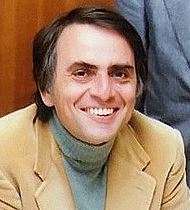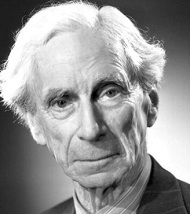|
TRANSLATE THIS ARTICLE
Integral World: Exploring Theories of Everything
An independent forum for a critical discussion of the integral philosophy of Ken Wilber
 Keith Price is Director & Treasurer of the Integral Institure Australia. With a broad spectrum of interests as a philosopher, researcher, teacher, computer scientist and data analyst, integral theory and practice provides the orienting framework for all his work, both unifying and giving connected meaning to the outcomes. Keith Price is Director & Treasurer of the Integral Institure Australia. With a broad spectrum of interests as a philosopher, researcher, teacher, computer scientist and data analyst, integral theory and practice provides the orienting framework for all his work, both unifying and giving connected meaning to the outcomes.
On Our Alleged InsignificanceKeith Price
There are approximately as many known orders of magnitude smaller than us as those we know of bigger than us.
How do we know that we are an unimportant recent mammalian species on an obscure planet? We see claims like this made all the time, usually as some kind of introductory admission or background comment, as in 'Of course, we know that, despite our self-conceit as a species that wants to think of itself as at the centre of things, we are actually very small and insignificant in the universe…'. A prime example would be the following widely quoted (and sung!) comment from Carl Sagan: Who are we? We find that we live on an insignificant planet of a humdrum star lost in a galaxy tucked away in some forgotten corner of a universe in which there are far more galaxies than people. (“Carl Sagan Quotes”).  Carl Sagan: ‘a humdrum star...’ Clichéd references to supposed medieval arrogance, due to the Ptolemaic scheme which has the Earth at the centre of the universe, are commonplace. They are also somewhat ill-informed, by the way. To the medieval mind, being at the centre was, in a number of respects, not a great thing. This was the realm of change, corruption and fallenness, with Hell at the centre of all! Nevertheless, we can at least admit that, to the medieval mind and indeed all periods before that, we matter in some ultimate cosmological sense. It is this view that is denied, explicitly or implicitly, by much modern thinking. What does it mean to say that we don't matter? If you look at it very carefully, it is actually hard to make out. To start with, you might ask who, or what, actually does matter if we don't? Talk of our position on an insignificant planet in an obscure star system on the edge of an unimportant galaxy (or that we have somehow been 'forgotten' by someone, as Sagan puts it) would seem to imply that there are other planets in other solar systems, and no doubt in other galaxies, that are known to be truly significant, in contrast to us. Hardly any thought is required to see that we know no such thing. If we ever do acquire such knowledge, it will presumably be because we have come in contact with an extra-terrestrial civilisation hailing from the planet in question (or knowing of it, at least), and they prove (as would be likely) to possess wisdom and technologies superior to our own. (It is perhaps worth noting that some people claim that this has already happened…) This would, however, be evidence that there exist people in the universe who matter as much or more than us, not that we don't! Nor should significance have anything to do with being in the actual centre of a galaxy, especially given the recent astronomical discovery that the centre tends to host a black hole! That is one sort of significance, granted, but not the sort that any kind of intelligent life would rationally aspire to. The only sense I can think of for the literal centre of the universe, moreover, would be the 'location' (if that makes any sense) of the Big Bang, which would be the spot that everything is, quite literally, accelerating away from. You can't be there any more than you can be in the centre of a galaxy! I am confident, though, that none of this is what is usually actually meant, though rhetoric like Sagan's would frequently suggest otherwise. What I think is actually being said is that there is no such thing as the kind of significance that medieval people thought we had. In other words, conscious intelligent life has no cosmological significance or meaning, which is more or less equivalent to saying that there is no such thing as cosmological significance as such, unless we mean by that great physical size or long existence. The rhetoric we hear not infrequently seems to suggest that too, but I am not impressed, and nor should you be. This last point requires some further argument, however, as a lot of people tend to think otherwise. With regard to size, there is a point that is seldom made, but once understood transforms one's outlook enormously. It is this: We are actually, in terms of the size dimensions that we know about (which is a critical point) quite middle-sized. There are approximately as many known orders of magnitude smaller than us as those we know of bigger than us. Thus the truth is (as far as we know) that we are NOT small. As one author put it (and I really like this), we appear to live on Middle Earth. That blunts the argument from size considerably, if anyone thinks it important. As for length of time, we appear to exist at the endpoint so far of a long process of creative evolution. Why does it matter that it took so long to get here? We are here now, with the self-consciousness and mental powers that we have. Rather than call us insignificant because it took so long and we haven't been here very long, why not think it significant that so much had to happen over such a long time for us to arrive? Thus I am not impressed by argument from size or time. The view that I think is actually behind the rhetoric was perhaps best expressed by Bertrand Russell:  B. Russell: ‘unyielding despair...’ That Man is the product of causes which had no prevision of the end they were achieving; that his origin, his growth, his hopes and fears, his loves and his beliefs, are but the outcome of accidental collocations of atoms; that no fire, no heroism, no intensity of thought and feeling, can preserve an individual life beyond the grave; that all the labours of the ages, all the devotion, all the inspiration, all the noonday brightness of human genius, are destined to extinction in the vast death of the solar system, and that the whole temple of Man's achievement must inevitably be buried beneath the debris of a universe in ruins—all these things, if not quite beyond dispute, are yet so nearly certain, that no philosophy which rejects them can hope to stand. Only within the scaffolding of these truths, only on the firm foundation of unyielding despair, can the soul's habitation henceforth be safely built. (From A Free Man's Worship) Let me say up front that I think Russell was profoundly wrong. These things are very far from 'not quite beyond dispute' or 'nearly certain'. Indeed, they can be shown with reasonable certainty to be false. Russell's view is based on the idea that we are the result of chance—'the accidental collocations of atoms', as he puts it—and, importantly, that our being is indeed made up of those atoms alone. This is the doctrine of philosophical materialism, or physicalism. It is one of the best kept secrets in modern philosophy (though it is starting to get out a bit more) that physicalism is in dire trouble as a doctrine. All the best philosophers of mind, such as David Chalmers and Colin McGinn, have been edging away from it in various ways for decades now, though so powerful is the pull of intellectual orthodoxy (as exemplified these days by such people as Richard Dawkins and Daniel Dennett) that they usually can't quite bring themselves to make a clean break. For anyone interested in following up these matters in detail, I can highly recommend Irreducible Mind: Towards a Psychology for the 21st Century, ed. Kelly & Kelly. The technical details are too involved to go into here, but essentially the nature of mind, and what it has been empirically demonstrated to be capable of doing, render Russell's view untenable. Moreover, the intrinsic extreme unlikelihood that a universe such as ours could come about completely by chance has been demonstrated beyond doubt since Russell's time. So many things about how the universe started up turn out to have been necessarily exactly as they were and are in order for there to be a universe at all, or for stars, planets, life or intelligence itself to show up. Among these are the precise strengths of the various fundamental physical forces, such as the weak and strong nuclear forces and gravity, and various other constants. So decisive is this case that those who still claim that we are an accident are reduced to claiming that there are infinitely many universes, and that we are in the one that just happened to turn out this way! This doctrine of the multiverse should be seen for what it is—a desperate and utterly unconvincing ploy to save a failing doctrine, the very doctrine that must be true if there is to be any substance to the idea that we are insignificant! So, I am maintaining that there is no reason to deny, and much reason to affirm, that we are actually significant in the universe, contrary to widespread and usually casual assumption in our time. The precise implications of this are a rather different matter, and I would hasten to point out that they by no means amount to an automatic endorsement of any traditional religious or spiritual doctrine. Indeed, a religion or spirituality that fully honours the many scientific and philosophical discoveries of modernity will necessarily look quite different from, say, the Western medieval world view mentioned earlier. Immanuel Kant's philosophy wrestled, not altogether successfully, with the beginnings of articulating such a new outlook, so rather than Russell's supposedly tough-minded rejection of our ultimate significance, I endorse the attitude of the following sentiments: Two things fill the mind with ever new and increasing admiration and awe, the more often and steadily reflection is occupied with them: the starry heaven above me and the moral law within me.(Immanuel Kant: Critique of Practical Reason: 5 161-2) “Emptiness is normal. The richness of our neighbourhood is the exception.”
© 1977 EAMES OFFICE LLC (Available at www.eamesoffice.com) |